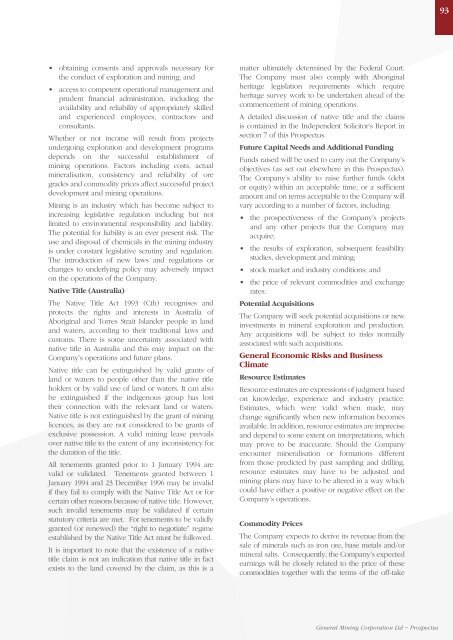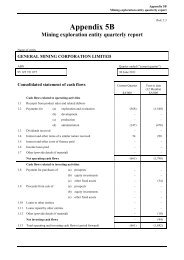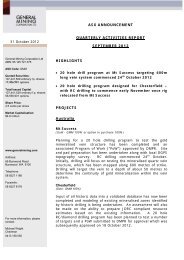Mongolia - General Mining
Mongolia - General Mining
Mongolia - General Mining
Create successful ePaper yourself
Turn your PDF publications into a flip-book with our unique Google optimized e-Paper software.
• obtaining consents and approvals necessary for<br />
the conduct of exploration and mining; and<br />
• access to competent operational management and<br />
prudent financial administration, including the<br />
availability and reliability of appropriately skilled<br />
and experienced employees, contractors and<br />
consultants.<br />
Whether or not income will result from projects<br />
undergoing exploration and development programs<br />
depends on the successful establishment of<br />
mining operations. Factors including costs, actual<br />
mineralisation, consistency and reliability of ore<br />
grades and commodity prices affect successful project<br />
development and mining operations.<br />
<strong>Mining</strong> is an industry which has become subject to<br />
increasing legislative regulation including but not<br />
limited to environmental responsibility and liability.<br />
The potential for liability is an ever present risk. The<br />
use and disposal of chemicals in the mining industry<br />
is under constant legislative scrutiny and regulation.<br />
The introduction of new laws and regulations or<br />
changes to underlying policy may adversely impact<br />
on the operations of the Company.<br />
Native Title (Australia)<br />
The Native Title Act 1993 (Cth) recognises and<br />
protects the rights and interests in Australia of<br />
Aboriginal and Torres Strait Islander people in land<br />
and waters, according to their traditional laws and<br />
customs. There is some uncertainty associated with<br />
native title in Australia and this may impact on the<br />
Company’s operations and future plans.<br />
Native title can be extinguished by valid grants of<br />
land or waters to people other than the native title<br />
holders or by valid use of land or waters. It can also<br />
be extinguished if the indigenous group has lost<br />
their connection with the relevant land or waters.<br />
Native title is not extinguished by the grant of mining<br />
licences, as they are not considered to be grants of<br />
exclusive possession. A valid mining lease prevails<br />
over native title to the extent of any inconsistency for<br />
the duration of the title.<br />
All tenements granted prior to 1 January 1994 are<br />
valid or validated. Tenements granted between 1<br />
January 1994 and 23 December 1996 may be invalid<br />
if they fail to comply with the Native Title Act or for<br />
certain other reasons because of native title. However,<br />
such invalid tenements may be validated if certain<br />
statutory criteria are met. For tenements to be validly<br />
granted (or renewed) the “right to negotiate” regime<br />
established by the Native Title Act must be followed.<br />
It is important to note that the existence of a native<br />
title claim is not an indication that native title in fact<br />
exists to the land covered by the claim, as this is a<br />
matter ultimately determined by the Federal Court.<br />
The Company must also comply with Aboriginal<br />
heritage legislation requirements which require<br />
heritage survey work to be undertaken ahead of the<br />
commencement of mining operations.<br />
A detailed discussion of native title and the claims<br />
is contained in the Independent Solicitor’s Report in<br />
section 7 of this Prospectus.<br />
Future Capital Needs and Additional Funding<br />
Funds raised will be used to carry out the Company’s<br />
objectives (as set out elsewhere in this Prospectus).<br />
The Company’s ability to raise further funds (debt<br />
or equity) within an acceptable time, or a sufficient<br />
amount and on terms acceptable to the Company will<br />
vary according to a number of factors, including:<br />
• the prospectiveness of the Company’s projects<br />
and any other projects that the Company may<br />
acquire;<br />
• the results of exploration, subsequent feasibility<br />
studies, development and mining;<br />
• stock market and industry conditions; and<br />
• the price of relevant commodities and exchange<br />
rates.<br />
Potential Acquisitions<br />
The Company will seek potential acquisitions or new<br />
investments in mineral exploration and production.<br />
Any acquisitions will be subject to risks normally<br />
associated with such acquisitions.<br />
<strong>General</strong> Economic Risks and Business<br />
Climate<br />
Resource Estimates<br />
Resource estimates are expressions of judgment based<br />
on knowledge, experience and industry practice.<br />
Estimates, which were valid when made, may<br />
change significantly when new information becomes<br />
available. In addition, resource estimates are imprecise<br />
and depend to some extent on interpretations, which<br />
may prove to be inaccurate. Should the Company<br />
encounter mineralisation or formations different<br />
from those predicted by past sampling and drilling,<br />
resource estimates may have to be adjusted and<br />
mining plans may have to be altered in a way which<br />
could have either a positive or negative effect on the<br />
Company’s operations.<br />
Commodity Prices<br />
The Company expects to derive its revenue from the<br />
sale of minerals such as iron ore, base metals and/or<br />
mineral salts. Consequently, the Company’s expected<br />
earnings will be closely related to the price of these<br />
commodities together with the terms of the off-take<br />
<strong>General</strong> <strong>Mining</strong> Corporation Ltd ~ Prospectus<br />
93




